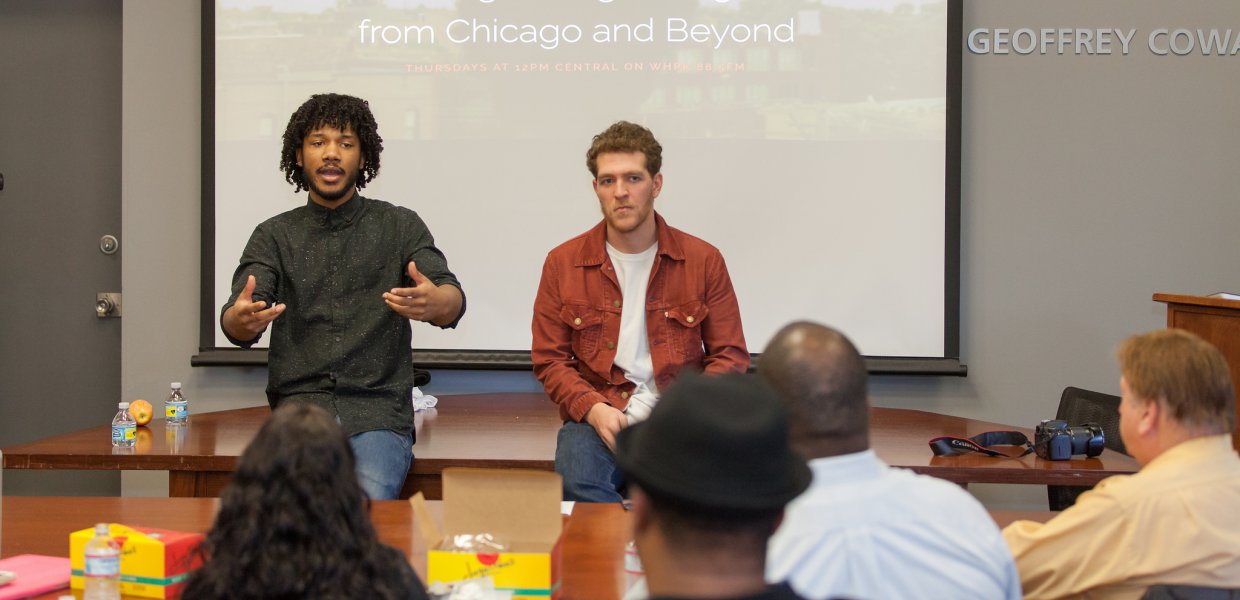Damon Williams and Daniel Kisslinger of the Chicago-based radio program AirGo visited USC Annenberg on Tuesday, Feb. 7, for what was essentially a dialogue about dialogue. The duo explored how facilitating conversation inspires active citizens and shapes the culture of cities and the nation.
The event was hosted by the Institute for Diversity and Empowerment at Annenberg (IDEA) as part of the series “We the People: Media Arts and Culture in the Struggle for Social Justice,” which aims to highlight creative workers and thinkers that utilize arts and media “as key tools in the arsenal for fighting injustice, building awareness and supporting community action,” according to Taj Frazier, director of IDEA.
“I was intrigued with how Damon and Daniel approach social justice and advocacy work, how they approach creativity, how they approach community building and service,” Frazier said. “So for IDEA, they're the perfect kind of organization for us to learn from.”
The co-hosts began the conversation by talking about the foundation of AirGo, which they describe as a showcase for the “strong young voices who shape Chicago and beyond, sharing their stories over the air, on wax, from the stage, and across the city.”
The premise, according to Williams, was to create a platform for conversation between those involved in the city’s recent creative renaissance and those involved in the rising social political movement.
“These people that are doing this work needed to be put in conversation with each other so we can create some kind of physical, tangible entity of proof of what's going on,” he said. “The analysis we have of our city and our home of Chicago speaks to what's happening nationally.”
“Our idea of the show from the beginning is that this is an entry point that’s rooted in the individuals and the humans and their stories, rather than the big heavy, top-down narratives,” Kisslinger added.
They turned the attention to the audience for a quick exercise in creating dialogue. Working in pairs, each attendees asked each other two simple questions: How is the world treating you today and how are you treating the world?
“Those questions are how we try to begin all of our conversations, to make sure that we are able to go deeper, and plug into the smaller and personal, to the big things that are happening,” Kisslinger said. “It all ties into the idea of, how do we humanize each other's stories? How do we humanize these big ideas?”
Their hope is that AirGo’s interviews will serve as a reference for future generations of creative thinkers and activists.
“Our goal is for this to be a historic, living document,” Williams said. “So far we have 75 hours of information from some of the most important people in the country, specifically in Chicago, who are reshaping this world. And we want people to engage with their stories 20 or 30 years down the line.”
Williams and Kisslinger emphasized the idea of space and how people can come together, engage and help build communities — and that all begins with knowing what you want from the community.
“We really want to push ourselves and inspire other to start with solutions,” Williams said. “There's so much going on — all the answers are already here. We just need to organize and cooperate with each other and propel them to the scale that we need. That only happens with community.”
To that end, communication doctorate student Joan Miller wondered if starting with the solution may dissuade potential activists from seeking out a cause, citing the theater director Bertolt Brecht and his theory of how catharsis can leave the audience too complacent.
“Do we step into the danger of letting people off the hook, or setting up for solutions when we don't 100 percent have a grasp of the problem yet?” she said.
“The idea of starting with a solution is that in every sphere, there is a long lineage of people who have already been doing work to address that problem,” Williams said. “It's often that we don't need new ideas, we just need more people [working toward that solution].”
As a former resident of Chicago, Antonio Cordero (B.A. Psychology/Political Philosophy ’ 17) is familiar with the kind of community spaces Williams and Kisslinger referred to, such as Young Chicago Authors, which engages more than 10,000 youths a year through creative writing. Cordero’s question concerned the ways in which he can begin to build community.
“Does that mean I just open up my house, cook dinner for 50 people, have people come through and say, 'let's have conversation?'” he asked.
“Go as micro as possible,” Kisslinger said. “Think about things you're wrestling with, find two to three other people who are wrestling with the same ideas, start at the human level, and it's just a series of those.”
Frazier hopes to continue developing the relationship with AirGo and other organizations that align with IDEA’s goals.
“These kinds of models that are happening not only locally but also nationally and internationally, that we can be in conversation with here at Annenberg, USC and L.A., are productive resources that we should be tapping into,” Frazier said.



